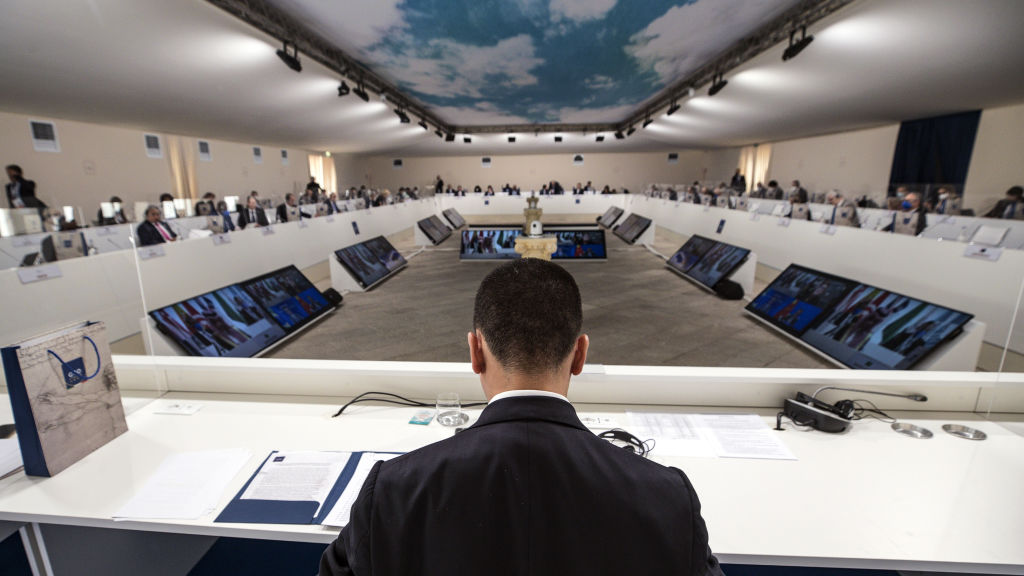
The stones of Matera in front of Palazzo Lanfranchi where the G20 Foreign Affairs Ministers' Meeting is held in Matera, Italy, June 29, 2021. /Getty
The stones of Matera in front of Palazzo Lanfranchi where the G20 Foreign Affairs Ministers' Meeting is held in Matera, Italy, June 29, 2021. /Getty
Editor's note: Jonathan Arnott is a former member of the European Parliament. The article reflects the author's opinions, and not necessarily the views of CGTN.
"Where shall I begin?" asked the White Rabbit to the King in Lewis Carroll's classic children's book "Alice in Wonderland." "Begin at the beginning," replied the King, "and go on until you come to the end." The response is intended to be disarmingly simple, and – like much of the book – is intended as a mathematical allegory.
I've lost count of the number of analysis and opinion pieces I've read about G7 and G20 meetings. I've written some of them myself. I do wonder though whether we fall into a trap when writing: we do not always begin at the beginning. It's natural for the casual reader to simply assume that the G20 (group of 20 leading economies) is merely an extension of the G7 group of leading economies, or indeed that the G7 is comprised of the world's seven largest economies.
Such an assumption would be false: China and India are not members of the G7, despite being the world's second and sixth-largest economies respectively. Russia was suspended from the G7 (previously known as the G8) in 2014 over its actions in the Crimea. The G7 may be full of powerful economies, but it does not represent the diversity of the world's economies. That's why the G20 is different: China, India and Russia are all represented. Three South American nations are G20 members, as are Australia and South Africa – every continent has a voice.
For this reason, the G20 and the G7 are massively different in character. Some of the issues are the same: taxing multinationals, for example. Without support from the G20 nations, proposals for minimum tax rates on the world's largest companies would be practically meaningless. The G7 is a forum for politics; the G20 is a forum for consensus. The G20 nations together account for more than 60 percent of the world's population, and over 80 percent of the world's GDP. Such a large forum brings its own challenges, as there is a relatively narrow range of issues which enjoy such a broad level of agreement.

The G20 Foreign Affairs Ministers' Meeting in Matera, Italy, June 29, 2021. /Getty
The G20 Foreign Affairs Ministers' Meeting in Matera, Italy, June 29, 2021. /Getty
Yet it provides clear opportunities for greater cross-border cooperation when it comes to challenges such as the pandemic. There are issues on which it makes sense for sovereign nations to work together: as Italian Foreign Minister Luigi di Maio told the G20, "The pandemic has highlighted the need for an international response to emergencies that transcend national boundaries."
The G20 Foreign Affairs Ministers' Meeting was held Tuesday in Italy, which holds the rotating presidency. From China's perspective, this is relatively comfortable: at the recent G7 meeting, Italy and Germany were the two nations urging restraint and avoidance of anti-China narratives in the official communique. In May, Chinese Premier Li Keqiang and Italian Prime Minister Mario Draghi spoke on the phone, pledging to enhance the bilateral relationship between Italy and China. Trade relations between the two countries are relatively strong, with Italy having signed a number of deals under Belt and Road Initiative in 2019.
In one sense, the G20 is the correct size to be able to influence the future course of the fight against this pandemic. It lacks the unwieldy nature of the United Nations, a forum too large to be able to find agreement. Yet it covers such a large fraction of the world's purchasing power that it is in a unique position to have an impact on developing countries.
Mere words at the G20 will not be sufficient. Words must turn to concrete proposals, and in turn that must lead to action. It is easy to set a target – such as the global "Zero Hunger" aim to ensure proper nutrition for all by 2030. It is far more challenging to agree a plan to achieve the stated aim, and for that plan to be introduced in full. Overseas aid has long been a thorny issue, often because of a public perception that money is not being spent efficiently or on the right priorities.
The Matera Declaration – named after the town in Italy where the foreign ministers' summit is being held – is a statement of intent, but it remains to be seen whether it will actually lead to the implementation of the necessary policies to end global hunger and malnutrition. The task may seem daunting, but there is only one place to start: as Lewis Carroll put it, we must begin at the beginning.
(If you want to contribute and have specific expertise, please contact us at opinions@cgtn.com.)

